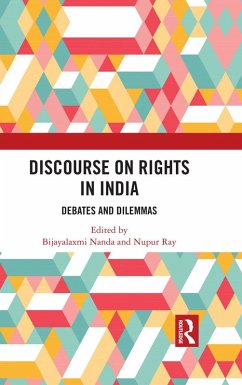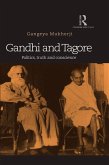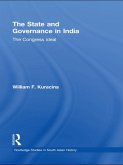Discourse on Rights in India (eBook, PDF)
Debates and Dilemmas
Redaktion: Nanda, Bijayalaxmi; Ray, Nupur
41,95 €
41,95 €
inkl. MwSt.
Sofort per Download lieferbar

21 °P sammeln
41,95 €
Als Download kaufen

41,95 €
inkl. MwSt.
Sofort per Download lieferbar

21 °P sammeln
Jetzt verschenken
Alle Infos zum eBook verschenken
41,95 €
inkl. MwSt.
Sofort per Download lieferbar
Alle Infos zum eBook verschenken

21 °P sammeln
Discourse on Rights in India (eBook, PDF)
Debates and Dilemmas
Redaktion: Nanda, Bijayalaxmi; Ray, Nupur
- Format: PDF
- Merkliste
- Auf die Merkliste
- Bewerten Bewerten
- Teilen
- Produkt teilen
- Produkterinnerung
- Produkterinnerung

Bitte loggen Sie sich zunächst in Ihr Kundenkonto ein oder registrieren Sie sich bei
bücher.de, um das eBook-Abo tolino select nutzen zu können.
Hier können Sie sich einloggen
Hier können Sie sich einloggen
Sie sind bereits eingeloggt. Klicken Sie auf 2. tolino select Abo, um fortzufahren.

Bitte loggen Sie sich zunächst in Ihr Kundenkonto ein oder registrieren Sie sich bei bücher.de, um das eBook-Abo tolino select nutzen zu können.
This book is a compelling examination of the theoretical discourse on rights and its relationship with ideas, institutions and practices in the Indian context. By engaging with the crucial categories of class, caste, gender, region and religion, it draws attention to the contradictions and contestations in the arena of rights and entitlements.
- Geräte: PC
- mit Kopierschutz
- eBook Hilfe
- Größe: 1.48MB
Andere Kunden interessierten sich auch für
![Human Rights Discourse in North Korea (eBook, PDF) Human Rights Discourse in North Korea (eBook, PDF)]() Jiyoung SongHuman Rights Discourse in North Korea (eBook, PDF)56,95 €
Jiyoung SongHuman Rights Discourse in North Korea (eBook, PDF)56,95 €![Global Justice in East Asia (eBook, PDF) Global Justice in East Asia (eBook, PDF)]() Global Justice in East Asia (eBook, PDF)41,95 €
Global Justice in East Asia (eBook, PDF)41,95 €![Machiavelli in Northeast Asia (eBook, PDF) Machiavelli in Northeast Asia (eBook, PDF)]() Machiavelli in Northeast Asia (eBook, PDF)41,95 €
Machiavelli in Northeast Asia (eBook, PDF)41,95 €![Gandhi and Tagore (eBook, PDF) Gandhi and Tagore (eBook, PDF)]() Gangeya MukherjiGandhi and Tagore (eBook, PDF)49,95 €
Gangeya MukherjiGandhi and Tagore (eBook, PDF)49,95 €![The State and Governance in India (eBook, PDF) The State and Governance in India (eBook, PDF)]() William F. KuracinaThe State and Governance in India (eBook, PDF)45,95 €
William F. KuracinaThe State and Governance in India (eBook, PDF)45,95 €![Promoting Democracy and Human Rights in Russia (eBook, PDF) Promoting Democracy and Human Rights in Russia (eBook, PDF)]() Sinikukka SaariPromoting Democracy and Human Rights in Russia (eBook, PDF)45,95 €
Sinikukka SaariPromoting Democracy and Human Rights in Russia (eBook, PDF)45,95 €![Power, Postcolonialism and International Relations (eBook, PDF) Power, Postcolonialism and International Relations (eBook, PDF)]() Power, Postcolonialism and International Relations (eBook, PDF)45,95 €
Power, Postcolonialism and International Relations (eBook, PDF)45,95 €-
-
-
This book is a compelling examination of the theoretical discourse on rights and its relationship with ideas, institutions and practices in the Indian context. By engaging with the crucial categories of class, caste, gender, region and religion, it draws attention to the contradictions and contestations in the arena of rights and entitlements.
Dieser Download kann aus rechtlichen Gründen nur mit Rechnungsadresse in A, B, BG, CY, CZ, D, DK, EW, E, FIN, F, GR, HR, H, IRL, I, LT, L, LR, M, NL, PL, P, R, S, SLO, SK ausgeliefert werden.
Produktdetails
- Produktdetails
- Verlag: Taylor & Francis
- Seitenzahl: 448
- Erscheinungstermin: 3. September 2018
- Englisch
- ISBN-13: 9780429827150
- Artikelnr.: 53997664
- Verlag: Taylor & Francis
- Seitenzahl: 448
- Erscheinungstermin: 3. September 2018
- Englisch
- ISBN-13: 9780429827150
- Artikelnr.: 53997664
- Herstellerkennzeichnung Die Herstellerinformationen sind derzeit nicht verfügbar.
Bijayalaxmi Nanda is Associate Professor, Department of Political Science, Miranda House, University of Delhi, India. Her areas of specialization include political theory, feminist politics and human rights. She has been conferred the Teacher's Excellence Award (2017) by the University of Delhi. She is actively involved with campaigns for the rights of girl children and women in India for the past two decades. Her publications include Sex-Selective Abortion and the State: Politics, Laws and Institutions in India (2018), Human Rights, Gender and Environment (co-authored, 2007) and Understanding Social Inequality: Concerns of Human Rights, Gender and Environment (co-edited, 2010). She has also contributed chapters to edited volumes and has written extensively on issues of gender discrimination, girl-child rights, health and education policies, human development and human rights. Nupur Ray is Assistant Professor, Department of Political Science, Kamala Nehru College, University of Delhi, India. Her areas of interest include political philosophy, feminist politics and political theory. She is associated with campaigns to counter violence against women in India. She has written extensively on the rights discourse and has published 'Exploring 'empowerment' and 'agency' in Ronald Dworkin's Theory of Rights: A Study of Women's Abortion Rights in India' in the Indian Journal of Gender Studies (2014). She has contributed chapters to edited volumes and presented papers at various national and international conferences.
Contributors. Preface. Acknowledgements. List of Abbreviations.
Introduction: Discourse on Rights in India: Debates and Dilemmas Part I:
Theorizing Rights: Diversity and Difference Chapter 1: Dimensions of Power
and Social Transformation Chapter 2: Constitutionalizing Rights,
Negotiating Difference: The Indian Experiment Chapter 3: Gender, Rights and
the Justice Gap: Going Beyond the Politics of Difference Chapter 4: Law,
Rights and Politics: Dilemmas and Responses Chapter 5: Human Rights,
Climate Change and Climate Justice Chapter 6: What can Human Rights add to
the Fight against Corruption? Some Lessons from India Part II: Gender,
Religion, Family, Work, Caste and Community: Issues and Contestations
Chapter 7: Sex-Selective Abortion and Reproductive Rights: A Syncretic
Feminist Approach Chapter 8: Bodily Rights and Agency: Looking at the
Rights Discourse of Women in Prostitution Chapter 9: Women in Politics and
the Subject of Representations Chapter 10: The Triple Talaq Controversy:
Gender Concerns and Minority Safeguards Chapter 11: Women and Disability:
Issues of Care Part III: The 'Myth' of Conflicting Rights: A Critique of
the Indian State Chapter 12: India's Education Policy and Failures of
Empathy Chapter 13: The 'Right' Music: Caste and 'Classical' Music in South
India Chapter 14: The Trajectories of Work, Sexuality and Citizenship: The
Rights of the Transgender in India Chapter 15: People and the Terrains:
PESA Reconsidered Chapter 16: Dilemmas in Kashmir: A Human Rights
Perspective. Beyond Conclusions: Discourse on Rights in India: A Case for
Reflective Autonomy. Index
Introduction: Discourse on Rights in India: Debates and Dilemmas Part I:
Theorizing Rights: Diversity and Difference Chapter 1: Dimensions of Power
and Social Transformation Chapter 2: Constitutionalizing Rights,
Negotiating Difference: The Indian Experiment Chapter 3: Gender, Rights and
the Justice Gap: Going Beyond the Politics of Difference Chapter 4: Law,
Rights and Politics: Dilemmas and Responses Chapter 5: Human Rights,
Climate Change and Climate Justice Chapter 6: What can Human Rights add to
the Fight against Corruption? Some Lessons from India Part II: Gender,
Religion, Family, Work, Caste and Community: Issues and Contestations
Chapter 7: Sex-Selective Abortion and Reproductive Rights: A Syncretic
Feminist Approach Chapter 8: Bodily Rights and Agency: Looking at the
Rights Discourse of Women in Prostitution Chapter 9: Women in Politics and
the Subject of Representations Chapter 10: The Triple Talaq Controversy:
Gender Concerns and Minority Safeguards Chapter 11: Women and Disability:
Issues of Care Part III: The 'Myth' of Conflicting Rights: A Critique of
the Indian State Chapter 12: India's Education Policy and Failures of
Empathy Chapter 13: The 'Right' Music: Caste and 'Classical' Music in South
India Chapter 14: The Trajectories of Work, Sexuality and Citizenship: The
Rights of the Transgender in India Chapter 15: People and the Terrains:
PESA Reconsidered Chapter 16: Dilemmas in Kashmir: A Human Rights
Perspective. Beyond Conclusions: Discourse on Rights in India: A Case for
Reflective Autonomy. Index
Contributors. Preface. Acknowledgements. List of Abbreviations.
Introduction: Discourse on Rights in India: Debates and Dilemmas Part I:
Theorizing Rights: Diversity and Difference Chapter 1: Dimensions of Power
and Social Transformation Chapter 2: Constitutionalizing Rights,
Negotiating Difference: The Indian Experiment Chapter 3: Gender, Rights and
the Justice Gap: Going Beyond the Politics of Difference Chapter 4: Law,
Rights and Politics: Dilemmas and Responses Chapter 5: Human Rights,
Climate Change and Climate Justice Chapter 6: What can Human Rights add to
the Fight against Corruption? Some Lessons from India Part II: Gender,
Religion, Family, Work, Caste and Community: Issues and Contestations
Chapter 7: Sex-Selective Abortion and Reproductive Rights: A Syncretic
Feminist Approach Chapter 8: Bodily Rights and Agency: Looking at the
Rights Discourse of Women in Prostitution Chapter 9: Women in Politics and
the Subject of Representations Chapter 10: The Triple Talaq Controversy:
Gender Concerns and Minority Safeguards Chapter 11: Women and Disability:
Issues of Care Part III: The 'Myth' of Conflicting Rights: A Critique of
the Indian State Chapter 12: India's Education Policy and Failures of
Empathy Chapter 13: The 'Right' Music: Caste and 'Classical' Music in South
India Chapter 14: The Trajectories of Work, Sexuality and Citizenship: The
Rights of the Transgender in India Chapter 15: People and the Terrains:
PESA Reconsidered Chapter 16: Dilemmas in Kashmir: A Human Rights
Perspective. Beyond Conclusions: Discourse on Rights in India: A Case for
Reflective Autonomy. Index
Introduction: Discourse on Rights in India: Debates and Dilemmas Part I:
Theorizing Rights: Diversity and Difference Chapter 1: Dimensions of Power
and Social Transformation Chapter 2: Constitutionalizing Rights,
Negotiating Difference: The Indian Experiment Chapter 3: Gender, Rights and
the Justice Gap: Going Beyond the Politics of Difference Chapter 4: Law,
Rights and Politics: Dilemmas and Responses Chapter 5: Human Rights,
Climate Change and Climate Justice Chapter 6: What can Human Rights add to
the Fight against Corruption? Some Lessons from India Part II: Gender,
Religion, Family, Work, Caste and Community: Issues and Contestations
Chapter 7: Sex-Selective Abortion and Reproductive Rights: A Syncretic
Feminist Approach Chapter 8: Bodily Rights and Agency: Looking at the
Rights Discourse of Women in Prostitution Chapter 9: Women in Politics and
the Subject of Representations Chapter 10: The Triple Talaq Controversy:
Gender Concerns and Minority Safeguards Chapter 11: Women and Disability:
Issues of Care Part III: The 'Myth' of Conflicting Rights: A Critique of
the Indian State Chapter 12: India's Education Policy and Failures of
Empathy Chapter 13: The 'Right' Music: Caste and 'Classical' Music in South
India Chapter 14: The Trajectories of Work, Sexuality and Citizenship: The
Rights of the Transgender in India Chapter 15: People and the Terrains:
PESA Reconsidered Chapter 16: Dilemmas in Kashmir: A Human Rights
Perspective. Beyond Conclusions: Discourse on Rights in India: A Case for
Reflective Autonomy. Index







